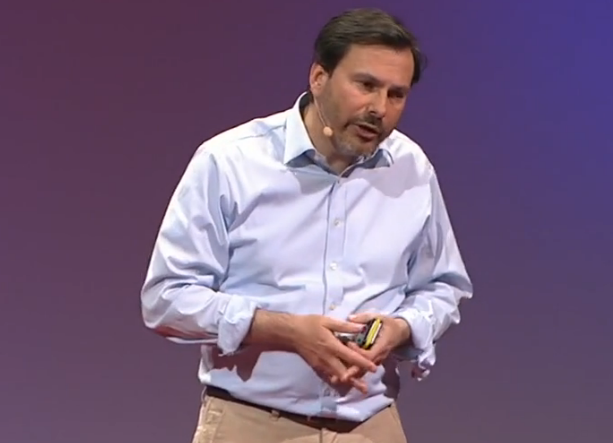And so you may say, well, given all of that, why then doesn't it work?
你可能说,就算这样,为什么不奏效呢?
Why can we not make our politicians change? Why can't we demand them?
为什么我们无法让政党改变?为什么我们无法要求他们?
Well I, like a lot of us, spend a lot of time complaining about how hard it is to make people change,
我,就像我们中间许多人,花很多时间抱怨让人改变有多困难,
and I don't think we should fuss about it.
我不认为我们应该对此小题大作。
I think we should just accept that we are an inherently conservative species.
我觉得我们应该接受我们是天生非常保守的种类。
We don't like to change. It exists for very sensible evolutionary reasons.
我们不喜欢改变。这种现状的存在是因为非常合理的进化原因。
We probably wouldn't still be here today if we weren't so resistant to change.
如果我们不是如此顽固执守的话,我们今天很可能不会在这里。
It's very simple: Many thousands of years ago, we discovered that if we carried on doing the same things,
很简单:几千年前,我们发现如果我们继续做同样的事情,
we wouldn't die, because the things that we've done before by definition didn't kill us,
我们就死不了,因为我们以前所做的,肯定让我们生存下去,
and therefore as long as we carry on doing them, we'll be okay,
所以只要我们继续这么做,我们就没事,
and it's very sensible not to do anything new, because it might kill you.
不去尝试新事物是很合理的,因为新事物可能会杀了你。
But of course, there are exceptions to that. Otherwise, we'd never get anywhere.
但当然,也有例外。不然我们就无法前进。
And one of the exceptions, the interesting exception,
一个有趣的例外是
is when you can show to people that there might be some self-interest in them making that leap of faith and changing a little bit.
当你告诉别人满怀信心,并做出一些改变是对他们自身有利的时候。
So I've spent a lot of the last 10 or 15 years trying to find out what could be that self-interest
所以我在过去的10到15年里试图找到那个
that would encourage not just politicians but also businesses and general populations,
可以鼓励不仅是政治家,也包括商家和大众的自身利益是什么,
all of us, to start to think a little more outwardly, to think in a bigger picture,
我们所有人,开始一点点往远看,想想大局,
not always to look inwards, sometimes to look outwards.
不要总是只顾自己,偶尔也向外(世界)看看。
And this is where I discovered something quite important.
这时我发现了一件相当重要的事。
In 2005, I launched a study called the Nation Brands Index.
2005年,我展开了一项称为“国家品牌指数”的研究。

What it is, it's a very large-scale study that polls a very large sample of the world's population,
这是一个非常庞大的调查,它从世界人口范围取出庞大样品数据,
a sample that represents about 70 percent of the planet's population,
这个样本代表了地球人口的70%,
and I started asking them a series of questions about how they perceive other countries.
我开始问他们一系列的问题,关于他们是如何看待自己国家的。
And the Nation Brands Index over the years has grown to be a very, very large database.
多年来国家品牌指数变成了一个非常非常庞大的数据库。
It's about 200 billion data points tracking what ordinary people think about other countries and why.
它具有大概两千亿数据点,记载了常人是如何看待他们国家的以及为什么。
Why did I do this? Well, because the governments that I advise are very, very keen on knowing how they are regarded.
为什么我要做这件事呢?因为我做顾问的政府非常非常想要知道他们是如何被看待的。
They've known, partly because I've encouraged them to realize it,
他们已经了解到,一半是出于我鼓励他们来意识到,
that countries depend enormously on their reputations in order to survive and prosper in the world.
国家很大程度上取决于他们的声誉来决定他们在世界中的生存及繁荣。
If a country has a great, positive image, like Germany has or Sweden or Switzerland,
如果一个国家有很伟大很正面的形象,像德国、瑞典或瑞士,
everything is easy and everything is cheap. You get more tourists.
所有事情就很容易而东西也会很便宜。你能得到游客。
You get more investors. You sell your products more expensively.
你能得到投资商。你可以高价卖出你的商品。
If, on the other hand, you have a country with a very weak or a very negative image,
另一方面,如果你的国家有一个非常弱或负面的形象,
everything is difficult and everything is expensive.
所有事情就变得困难而且东西昂贵。
So governments care desperately about the image of their country,
所以政府极度关注国家的形象。
because it makes a direct difference to how much money they can make,
因为它直接影响到他们能挣多少钱,
and that's what they've promised their populations they're going to deliver.
这也是他们向国民所承诺的他们将给予的。



